Also attending were: Member of the Party Central Committee, Chairman of the Economic and Financial Committee Phan Van Mai; members of the Economic and Financial Committee; representatives of the Standing Committees of the National Assembly; representatives of leaders of relevant ministries, branches and localities.
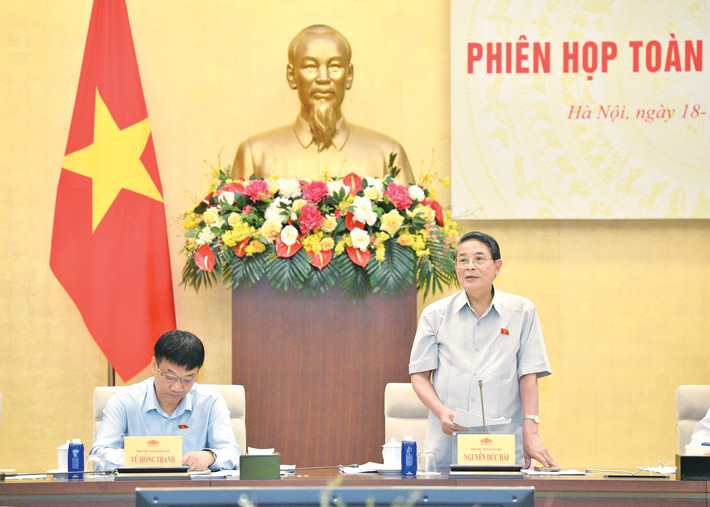
At the meeting, the Economic and Financial Committee examined three contents, including the draft Law on State Budget (amended).
According to the Draft of the State Budget Law (amended), the draft law consists of 7 chapters and 76 articles. The draft law stipulates that the outstanding loan balance of local governments is reduced from 3 local groups to 2 local groups and increases the outstanding loan balance compared to current regulations.
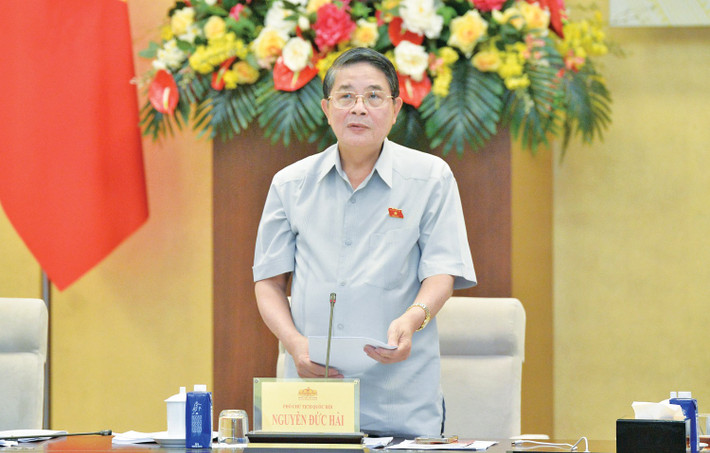
In addition, supplement the principle of prioritizing state budget expenditures for science, technology development, innovation and digital transformation; regulations on funds to carry out this task.
Add more subjects to publicize extra-budgetary state financial funds; publicize the conclusions of the Inspection agency and the results of implementing the conclusions of the state budget inspection; and publicize on social networks and electronic information portals of agencies and units.
The Draft Law also amends and supplements the basis for making state budget estimates to ensure full coverage of revenue sources and amends and supplements to clarify the requirements for making regular expenditure estimates.
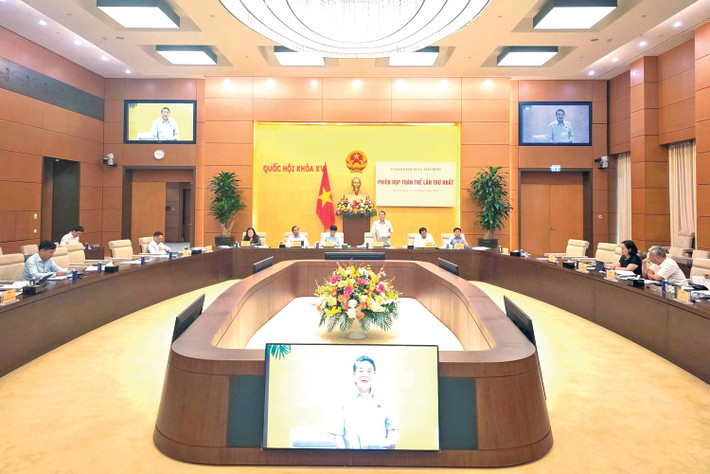
Speaking at the meeting, Vice Chairman of the National Assembly Nguyen Duc Hai emphasized that this is a very important Law project, both the Government and the National Assembly are actively interested in directing. The current context has many changes in the socio-economic situation, the organizational structure of the state apparatus, and in the near future, a number of articles of the Constitution related to the organization of the government and agencies will be amended. The budget is to serve the activities of the state, if the organizational structure of the state apparatus changes, the budget will also change accordingly.
In the field of state budget, the most important are revenue and expenditure, decisions on the use of revenue sources and expenditure structures, budget decentralization, and budget procedures. Expressing this point of view, the Vice Chairman of the National Assembly noted that the amendment of the law must be very urgent but must have a focus and key points. Therefore, it is recommended that the Ministry of Finance evaluate and summarize and draw basic conclusions on the contents of the amendments so that National Assembly deputies have a basis when considering and giving opinions, creating consensus.
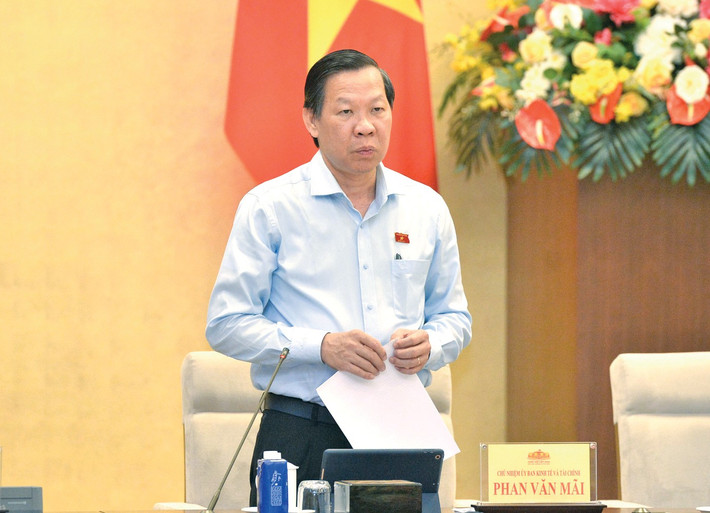
Chairman of the Economic and Financial Committee Phan Van Mai speaks. Photo: Ho Long
The Vice Chairman of the National Assembly also suggested that it is necessary to design tasks in the context of promoting growth, placing very high demands on the use of national resources. To serve the goal of high growth, it is necessary to study and refer to the regulations of other countries to apply appropriately to the special context of our country, when we need to be both proactive and creative, while ensuring the initiative of the implementing agencies. In addition, it is necessary to clearly define the viewpoints and principles in allocating investment capital, local budget autonomy, and decentralizing local budget authority.
The Vice Chairman of the National Assembly stated that this amendment to the law needs to ensure the creation of resources to serve growth targets, reduce regular expenditures, increase investment for development, strengthen the leading role of the central budget, promote the proactive role of local budgets, and at the same time be consistent with the reorganization of local governments into two levels.
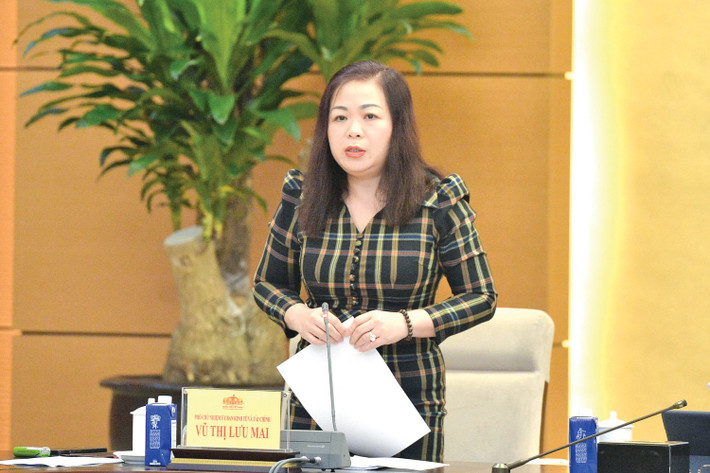
In addition, the Vice Chairman of the National Assembly said that our budget ensures consistency from top to bottom, but the budget preparation and settlement process are very complicated. The budget must be prepared from bottom to top, and then summarized at the Ministry of Finance. Currently, to promote decentralization, each level of the budget is responsible for the budget.
Regarding the structure of revenue sources, the Vice Chairman of the National Assembly requested that central and local budget revenue sources be appropriately divided. At the same time, budget management must ensure management of deficits and public debt.
At the meeting, members of the Economic and Financial Committee said that the amendment of the State Budget Law is necessary, with sufficient political, legal and practical basis, contributing to the successful implementation of socio-economic development goals in the new period. However, it is recommended that the impact assessment should be more specific, especially the impact on the central and local budgets when changing the method, division ratio, outstanding loan balance, and the issuance of fees and charges outside the list.
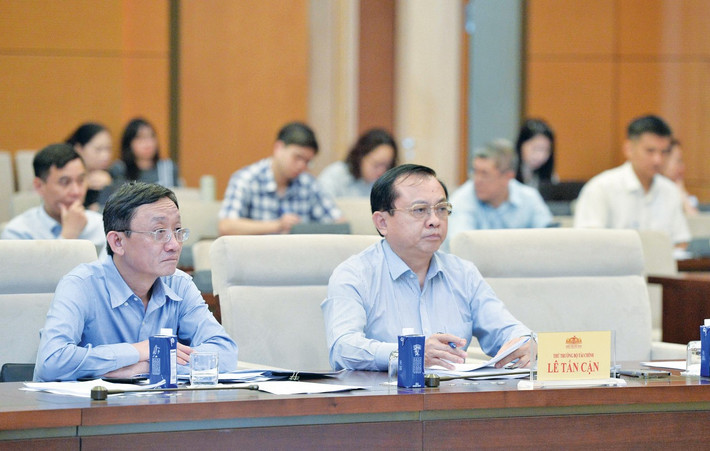
Regarding the provisions in the draft Law on allocating reserve funds for other necessary tasks for which the budget has been arranged but is not sufficient, there are opinions suggesting consideration because adjusting and supplementing the budget has been stipulated in this law and there are procedures, orders, and authorities to supplement and adjust the budget for tasks for which the budget has not been arranged sufficiently.
Opinions also suggested carefully reviewing and examining regulations on the tasks and powers of People's Councils at all levels; decentralizing revenue sources between the central budget and local budgets; adjusting state budget estimates...
Next, the Economic and Financial Committee reviewed the draft Resolution of the National Assembly on Financial Centers in Vietnam and the draft Law amending and supplementing a number of articles of the following laws: Law on Bidding; Law on Investment under the Public-Private Partnership; Law on Customs; Law on Export Tax and Import Tax; Law on Investment; Law on Public Investment; Law on Management and Use of Public Assets.
Source: https://daibieunhandan.vn/phien-hop-toan-the-cua-uy-ban-kinh-te-va-tai-chinh-post410774.html


![[Photo] More than 17,000 candidates participate in the 2025 SPT Competency Assessment Test of Hanoi National University of Education](https://vphoto.vietnam.vn/thumb/1200x675/vietnam/resource/IMAGE/2025/5/17/e538d9a1636c407cbb211b314e6303fd)
![[Photo] Nearly 3,000 students moved by stories about soldiers](https://vphoto.vietnam.vn/thumb/1200x675/vietnam/resource/IMAGE/2025/5/17/21da57c8241e42438b423eaa37215e0e)
![[Photo] Readers line up to visit the photo exhibition and receive a special publication commemorating the 135th birthday of President Ho Chi Minh at Nhan Dan Newspaper](https://vphoto.vietnam.vn/thumb/1200x675/vietnam/resource/IMAGE/2025/5/17/85b3197fc6bd43e6a9ee4db15101005b)
![[Photo] Prime Minister Pham Minh Chinh chairs meeting on science and technology development](https://vphoto.vietnam.vn/thumb/1200x675/vietnam/resource/IMAGE/2025/5/17/ae80dd74c384439789b12013c738a045)





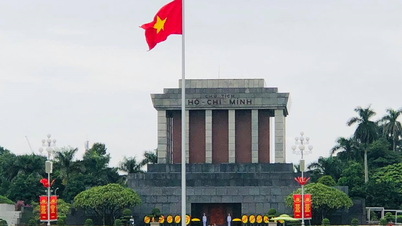
























































































Comment (0)